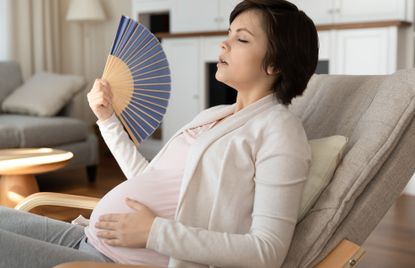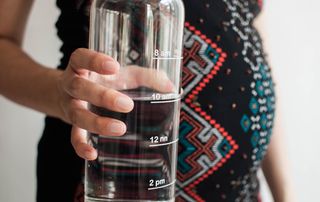Hot flashes in pregnancy - why do I feel hot and what helps?
Don’t let hot flushes hold you back


Hot flashes in pregnancy aren't unusual and are nothing to be concerned about. It's just caused by hormones.
Also known as hot flushes, hot flashes are one of a myriad of pregnancy symptoms – which can often include pregnancy cravings and pregnancy heartburn.
While frustrating, they are rarely a sign of anything serious. Here, we explain why and when you'll have them (if you have them at all), and the natural ways you can try to cool down fast during pregnancy to help ease your hot flashes.
Hot flashes - why do I feel hot in pregnancy?
Many – but not all – pregnant women will experience hot flashes in pregnancy, just like not all women will get hot flushes during the menopause. It really does depend on the individual.
Midwife Marley, a spokesperson at the annual Baby Show told us, 'It's very common to get hot flashes in pregnancy; sometimes it's one of the first symptoms a woman gets. They are usually caused by hormonal changes (sudden changes in oestrogen and progesterone levels), and increased blood flow in the body, causing your temperature to elevate slightly. The extra blood can rush to the face giving you a red, flushed appearance.'
Kate Mundell, a midwife for Naytal, the online women's health clinic, agrees. 'The hormonal changes our bodies go through during pregnancy are phenomenal,' she says. 'And hot flashes or generally feeling warmer during pregnancy is almost certainly caused by fluctuations in hormone levels – this is the case during the first trimester.'

As your pregnancy progresses, there are additional reasons why you may feel warm or flushed. 'During the third trimester, when the uterus has grown significantly, this will also cause a raise in body temperature as the cardiovascular system is working that bit harder to do everything. This can be due to carrying extra weight and a smaller lung capacity as the baby gets bigger,' adds Kate.
When do hot flashes in pregnancy start?
Hot flashes can begin very early and occur at any time during the pregnancy.
'Not everyone gets them, but for those that do, they can start as early as around the time your period is due – sometimes before knowing you're pregnant,' says Marley.
'Some women experience them earlier on during pregnancy (the first 12 weeks) – especially if they are suffering badly from morning sickness or hyperemesis,' says Kate, although she adds that they are most common during the third trimester (28 weeks and onwards).
You may also find that you experience hot flashes beyond pregnancy. Kate explains: 'Hot flushes during the night or night sweats are also common postnatally – again, due to hormone fluctuations after giving birth.' This is a natural hormonal response as your body adapts to all the changes it's been through. Kate adds: 'They can be particularly severe if you are breastfeeding, especially when the feeding is becoming established.'
While uncomfortable, these flashes and sweats aren't anything to worry about. However, if you have any concerns talk to your GP or health visitor.

What helps with pregnancy hot flashes?
As medication is neither available or advisable for hot flashes in pregnancy, your best bet is to take practical steps to avoid getting overheated. As a flush can strike at any time, making small changes to your lifestyle early on could be immensely useful. 'Hot flushes may come and go throughout pregnancy so it's good to be prepared!' says Marley.
'Hot flashes are just one of those symptoms that we grin and bare to some extent,' says Kate. 'There are a few things women can do to help cool down, though.' Here, Marley and Kate recommend that you:
- Wear layers so you can remove clothing quickly if you suddenly feel hot
- Wear breathable, natural fabrics such as cotton and linen
- Sleep in thin clothing and use a room fan at night, so you're less likely to overheat
- Take cool or tepid showers
- Increase your fluid intake – drinking more water always helps! Keep a water bottle to hand, along with ice chips.
- Carry a fan or an electric hand fan (we like the versatility of VersionTECH's Handheld Fan, £16.45, Amazon)
- Alternatively, a small spray bottle of water is handy to cool you down, or a facial mist such as Evian Brumisateur Facial Spray (£5.13, Amazon)
- Eat little and often to ensure blood sugar levels stay consistent. This is because blood sugar spikes or crashes can sometimes cause our body temperature to change. Following our pregnancy diet may help.
If you feel consistently hot, you may have a temperature. In this instance, use a thermometer. Pregnancy charity Tommy's recommends that if the reading is 37.5°C (99.5°f) or above, that you speak to your GP or midwife, or call 111.
Video of the Week
Goodto Newsletter
Parenting advice, hot topics, best buys and family finance tips delivered straight to your inbox.

Debra Waters is an experienced online editor and parenting writer. She also has a strong background on health, wellbeing, beauty, and food. She currently writes for Goodto and Woman&Home, and print publications Woman, Woman’s Own, and Woman’s Weekly. Debra has written for What to Expect, Everyday Health, and Time Out. In addition, she has had articles published in The Telegraph and The Big Issue.
-
 The adorable sign Prince Louis can’t wait to be a future King like his brother Prince George
The adorable sign Prince Louis can’t wait to be a future King like his brother Prince GeorgeThe Wales youngster made a telling move during a secret visit to the Strictly Come Dancing studios
By Selina Maycock Published
-
 This baby name is giving 'retro chic' vibes and it's predicted to be a top choice for parents in 2024 – would you choose it?
This baby name is giving 'retro chic' vibes and it's predicted to be a top choice for parents in 2024 – would you choose it?It’s stolen the limelight right at the last minute
By Daniella Gray Published